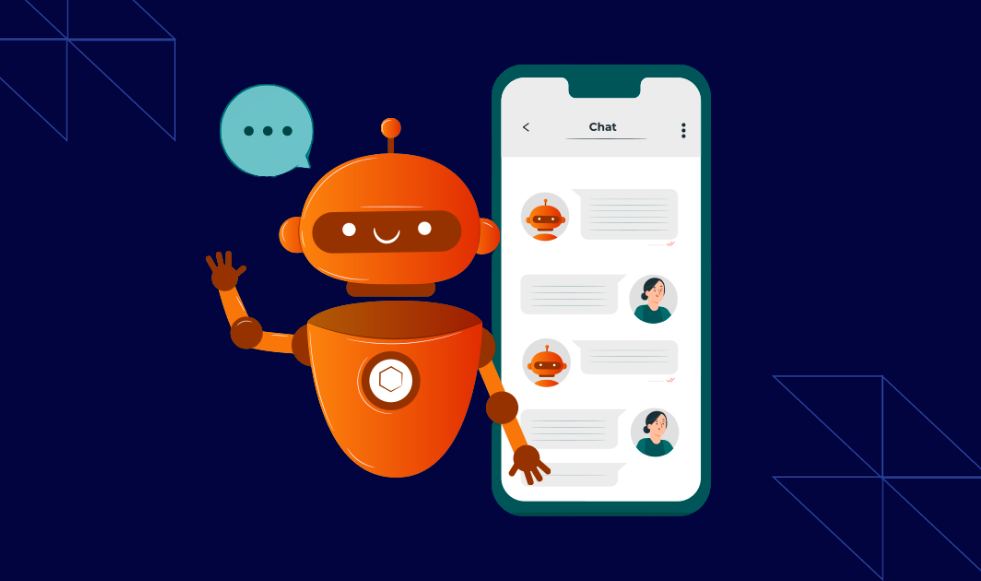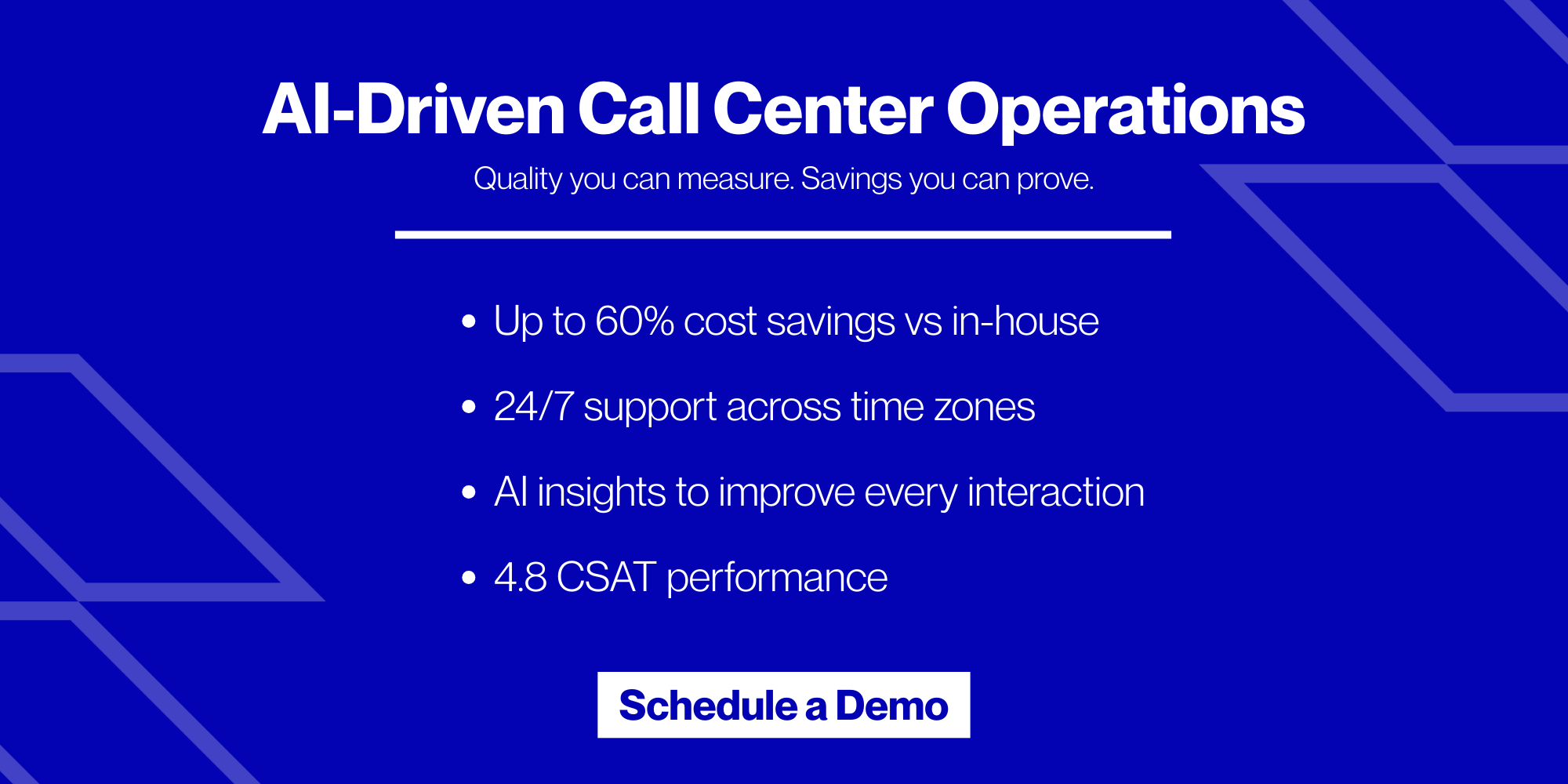Table of Contents
- Introduction
- An overview of the traditional call centres
- The evolution of call centres
- What is the role of AI automation in the call centres?
- What are the benefits of AI Automation in Call centres?
- What are the best practices for implementing AI in call centres?
- Define clear goals and objectives for the call centres
- Start Small
- Choose the right AI
- Offer proper training for the call centre agents
- Ensure Data privacy and security
- Frequent Monitoring
- Have a proper check
- Integrate with the existing call centre systems
- Monitor the AI process continuously
- Challenges and considerations of the AI-powered customer service
- Future of AI automation in call centres
- Conclusion
- Frequently Asked Questions.
Introduction
The year 2024 has seen an unprecedented hype in AI. But the year 2025 is far from that. This year, we have witnessed significant transformations in various industries due to the impact of AI. Right from health care to marketing, the presence of AI has become inevitable. One such industry that benefits from AI is the call centers. With the right integration of Artificial Intelligence, the global call centers are enhancing the inclusive customer experience, elevating operational efficiency, and improving overall user experiences. Through the integration of AI, the call centres can provide 24/7 global support.
Through this blog, we will give you a proper insight into how AI is making call centres more accessible for global customers, including advancements in AI call centre automation and many more. Before diving into the topic, we will take a look at the traditional call centre patterns and the evolution of call centres.
An overview of the traditional call centres
The traditional call centres were built on the primary goal of handling volumes of calls by human agents. You have seen call centres where there is continuous speaking, sounding like someone is reading the script. This has led to the customer losing interest and occasionally experiencing frustration. Gone are those days. The latest technologies and AI-powered customer service have made a huge impact.
The evolution of call centres

We will take a quick glance at the evolution of call centres. In the early days, call centers were primarily about managing phone calls.In order to handle calls more effectively, computerized systems were introduced as technology advanced. Although they were revolutionary, Interactive Voice Response (IVR) and Automatic Call Distributors (ACDs) mainly depended on human intervention.
We have now ventured into the realm of AI automation. It has completely changed the concept of the conventional call center. AI is capable of comprehending and performing repetitive tasks with the highest level of precision thanks to the most recent technologies and automation tools. One of the major milestones is the introduction of the virtual assistants. They can respond to customer queries in real time.
What is the role of AI automation in the call centres?

The introduction of the newest technologies, such as chatbots and virtual assistants, to handle routine tasks is the main goal of AI automation in call centers. These include managing the workflows, responding to inquiries, and fixing problems without the need for human involvement. The ultimate goal of automated call centre solutions is to provide an inclusive customer experience, increasing efficiency and reducing operational costs.
Conversational AI is used by modern chatbots, virtual agents, and voice bots to mimic real-world interactions on a variety of digital and voice platforms (including web chat, VoIP calling, SMS, email, and social media messaging). These conversational technologies help callers with tasks like scheduling appointments, paying bills, routing, and basic customer support by understanding a variety of customer inputs and providing responses that seem natural.
Check out the key components of the AI-powered customer service in global call centres.
| Key Components | What do they do? |
| Chatbots | Chatbots are simply conversational agents powered by artificial intelligence (AI) that can respond to consumer inquiries via voice or text chats. Without human assistance, they can conduct transactions, walk users through procedures, and instantly respond to commonly asked questions. |
| Voice recognition | AI is able to comprehend and process spoken language thanks to voice recognition technology. This enables automated systems to understand the intentions of customers and respond appropriately, or refer issues to human agents when necessary. |
| Natural Language Processing(NLP) | NLP is the technology that allows AI to understand and interpret human language. It offers Multilingual AI support. Through this, it can understand human emotions, queries and provide appropriate responses. |
| Machine Learning(Ml) | The ML algorithm powers the AI to understand volumes of information, including call transcripts, chat logs, and customer profiles. This allows AI to consistently enhance its performance, adjust to new situations, and provide increasingly precise insights as time progresses. |
| Predictive Analytics | Through predictive analytics, the AI can analyse past customer interactions and allow call centres to optimize the staffing levels and create targeted marketing strategies based on customer trends. |
| Automated Call Distribution(ACD) | AI-driven automated call distribution effectively shuffles the call and sends it to the appropriate sections based on the skills and other parameters. |
What are the benefits of AI Automation in Call centres?

The introduction of AI has taken the global market to a whole new level. Through AI-powered call centres, you can improve productivity, drive better business outcomes, and provide a better customer experience. Come, let us explore some of the key benefits of AI automation in call centres.
- Improved Customer Experience: For any business to thrive in this competitive world, customer satisfaction is very important. Frustrated or unsatisfied customers can have an adverse effect on the business. With AI automation, call centres can provide timely updates and responses to the customer, thus leading to an inclusive customer experience. With faster and accurate responses, customers are happier. With the lesser wait time, they get what they really want.
- Personalized and elevated customer interactions: By offering 24/7 global support, the long waiting hours are eliminated. Leveraging customer data, each interaction is tailored for self-service or live assistance, increasing satisfaction and deepening loyalty. Through Multilingual AI support, it can offer personalized support to the customer.
- Increased Efficiency and boost operational productivity: The AI handles repetitive tasks like answering FAQS, managing appointments, and processing transactions skillfully. This allows the human agents to focus on more complex tasks. Through this, you can boost the productivity across the entire organization.
- Cost Efficiency: With the AI automation, you can reduce the operational costs. It also lowers the need for additional staff during the peak hours, thus offering scalability.
-
- Unlock actionable intelligence for continuous improvement: Analytics surface patterns in sentiment, agent performance, and emerging trends from every customer conversation. Leaders can use these insights to refine training, streamline workflows, and consistently raise service quality.
- 24/7 global support: The AI automation offers 24/7 global support without any added cost for hiring more agents to cover night shifts.
- Omnichannel Support: AI can be integrated with multiple communication channels, be it SMS, email, calls, etc., helping automate and simplify all channels of customer communication
What are the best practices for implementing AI in call centres?

AI cannot be directly implemented in the call centres. It requires proper planning and execution. Here are a few tips to consider while implementing AI in call centres.
-
Define clear goals and objectives for the call centres
First things first. Before you implement AI in call centers, you have to set definite goals. Know exactly what you want? Whether it is to reduce the call volume, improve first call resolution, lower handling time, or boost CSAT score. Ensure that the artificial intelligence call center solution you choose is able to help you out with your main objectives.
-
Start Small
Avoid purchasing an enterprise-level AI contact center solution in one go; start with low-risk, high-impact applications such as utilizing chatbots for FAQ responses, automating call routing, and scheduling appointments with AI tools like Emitrr. Subsequently, you can incorporate additional features as your operations grow. Performance data and user feedback can guide you in transitioning to more intricate scenarios, including real-time agent support or predictive analytics.
-
Choose the right AI
Do you know that all AI is meant for call centres? When looking for an AI tool, consider natural language processing (NLP) capabilities, integration with your CRM, ticketing, and telephony systems, multilingual support capabilities, real-time analytics, and reporting features to get the best out of your new system.
-
Offer proper training for the call centre agents
Before implementing AI, proper training should be given to the call centre agents to work with AI confidently and responsibly. When implementing new AI tools, ensure that your call center agents receive adequate support to learn their usage. Transitioning can be challenging, so it is essential to provide your team with the reassurance and guidance they require. Remind them that AI is intended to assist, not to replace them. Additionally, this presents an excellent opportunity to enhance vital skills, such as effective communication and the use of technological tools, enabling your team to feel empowered rather than marginalized.
-
Ensure Data privacy and security
While using the AI in call centres, always ensure that the data and privacy of the customers are protected. Always let the customers know why you are collecting this data and how it is used, and how long these data will be kept.
-
Frequent Monitoring
The AI implemented needs constant monitoring for smooth functioning. So, with the help of your contact center AI, track metrics such as deflection rate, resolution time, CSAT, etc., analyze conversation transcripts, update training data and intents, and optimize the system as and when needed for the best results.
-
Have a proper check
Before implementing your new AI contact centre solutions, always make sure to check them thoroughly. Look for any unexpected friction points, edge cases, customer confusion, or drop-offs, and then, based on your learning, fine-tune the system before broader deployment.
-
Integrate with the existing call centre systems
For the successful implementation of AI, it is important to have a seamless integration of the existing call centre programs with the latest marketing tools.
-
Monitor the AI process continuously
AI is a continuous learning process. Regularly assess the performance of your AI solution by analyzing customer feedback and essential metrics. Utilize this information to pinpoint areas that require enhancement and to fine-tune your AI strategy. Consistently retrain your AI models with updated data to maintain their accuracy and relevance. This practice guarantees that your AI consistently provides optimal outcomes and positions your call center as a leader in customer service.
Challenges and considerations of the AI-powered customer service

Though automated call centre solutions come with various benefits, some challenges need to be addressed.
- Job Displacements: There is a risk of job losses. It may reduce the need for specific roles while also creating opportunities for new skills and positions.
- Technical Issues: There is nothing like a perfect machine. AI and automation require constant upgrades and maintenance for effective functioning.
- Ethical and Privacy Concerns: Managing customer information with care is essential. Companies must guarantee that their AI and automation methods adhere to privacy laws and ethical guidelines.
- Harmonizing Technology and human intervention: It is always important to perfectly balance the technology and human intervention. Not all the issues can be resolved with the AI intervention. Some require human empathy and personal interaction.
Future of AI automation in call centres
The year 2025 has made various revolutions in the call centre industry. The future of AI opens even more possibilities. Emerging trends include using advanced AI models that can handle even more complex tasks and integrating virtual reality (VR) for immersive customer service experiences.
Businesses should stay agile and be ready to adapt to these changes.
One important thing that the business needs to consider is to always stay updated with the emerging trends. This means preparing for the future with the right technologies, continuously training staff, and staying updated.
Conclusion
AI and Automation are changing the global call centre systems. It has many underlying benefits, including improved customer satisfaction, enhanced efficiency, and reduced costs. However, it is important to thoughtfully consider the challenges and implement a perfect harmony between the AI technology and human interaction. With the right usage of AI automation in the call centers, you can take your business to the next level.
Atidiv perfectly integrates the AI and human expertise to enhance the customer experience through various channels. We offer you 24/7 global support, Multilingual AI support, and an Inclusive customer experience.
Frequently Asked Questions about the AI-powered customer service
-
What is the role of AI in improving customer service in call centres?
AI enhances customer service by providing quick responses, reducing waiting times, automating repetitive tasks, and providing personalized support.
-
How is AI changing call centers in 2025?
By integrating AI solutions, call centers can increase efficiency, reduce operational costs, and provide personalized services to customers.
-
What are some of the common AI solutions in the call center industry?
The common AI tools include chatbots, virtual assistants, sentiment analysis, predictive analytics and intelligent routing.

